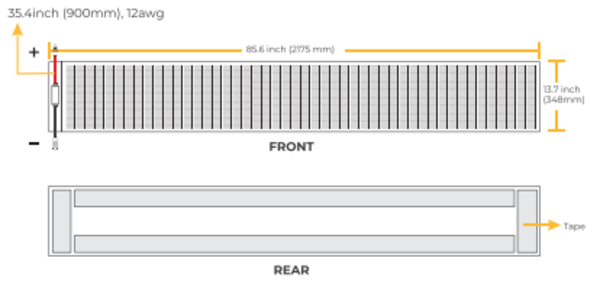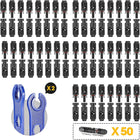7 Reasons to Use CIGS Panels for Your Home

You are aware that all your home appliances like lights, fans, refrigerators, washing machines, dishwashers, TV, and mobile phones can be run by solar panels. Solar panels are installed on the roof of the house, generating free electricity for a lifetime. Even you can sell electricity and earn dollars. You have already seen solar panels on rooftops in your neighborhood. Sometimes it looks good but sometimes it looks odd.
But there are solar panels that always look good on rooftops. Do you also know that you can install solar panels on sun-facing walls, windows, and facades to generate electricity? Yes, you heard right. These panels can also be installed on sun-facing walls, and windows of your house apart from your rooftop. And aesthetically looking great.
These are the latest innovation in solar cell technology and are available in the market. Continue reading this article to know more about this.
CISG Solar Panel Technology
These solar panels are called CIGS panels. CIGS or Copper Gallium Indium Di-selenide compound is used in CIGS solar cells, which are sandwiched between conductive layers. This material adheres well to a variety of substrates, including glass, plastic, steel, and aluminum. Some CIGS panels have a flexible backing, which allows for full-panel flexibility.
Why CIGS Solar Panels Are the Best Fit for Your Home?
There are several distinct characteristics of flexible CIGS solar panels that make them the best suitable panel for a home.
1. Thinner and flexible
CIGS solar panels are a lot thinner than crystalline silicon cell panels. Also, it has no glass or metal frame, unlike silicon crystalline solar panels. That makes it 6 times lighter. Some CIGS solar panels are 360 degrees flexible. 100W or 200W flexible CIGS solar panels from BougeRV can be fitted on any curved surface like roof tiles or shingles, sun-facing walls, or windows of our house.

2. No concern for breakage
As CIGS solar panels are having no glass on the top, there is no worry about breakage. This is a big relief for homeowners with rooftop solar systems. As the solar panels are installed on the top of the roof, there is a risk of damage in case of usual crystalline silicon solar panels from hailstorms, during installation, or any mischief. However, with CIGS solar panels, you are completely free of this risk.
3. Completely waterproofed
The Flexible CIGS Solar Panel from BougeRV is waterproof to IP68 standards and has improved rainfall drainage to reduce the impact of partial shade. The connectors and junction box are also waterproof to IP68 standards. As a result, it can perform better than a rigid panel in a wet outdoor environment.
(Please confirm IP65, 67 or 68 ingress protection)
4. Simple to set up
Flexible CIGS solar panels have no metal frames or glass. They are very light. Therefore, these panels do not need racking systems to install on the roof of the house. Another point is these racking systems are also different depending on the type of roofs like tiles, shingles, ceramic slates, and metal or wooden roofs. These racking systems add cost to the solar systems and the selection of these racking systems are also not easy. One requires professional help from an experienced person.
On the other hand, Flexible solar panels are very easy to install on any type of roof or any curved surface. It takes the shape of the roof.

Solar panel installation is as simple as two steps. Peel the protection tape first, and then attach the panel to the roof or any other surface as shown below. The panel is then connected to the battery controller, and the solar panel is ready to use. 
5. Generates more electricity
CIGS solar panels have energy conversion efficiencies comparable to traditional silicon panels. The efficiency of CIGS solar panels from BougeRV is 16%, which is among the highest in the market.
Also, CIGS solar panels consist of direct bandgap material and are more light-sensitive. That means, it can capture a significant portion of the light spectrum compared to crystalline solar cells. As you might know that the sunlight received on the earth’s surface is a mixture of different wavelengths as shown in the below image.

Image source: https://www.e-education.psu.edu
In the early morning hours and the late afternoon, the sky becomes red and orange. In these hours our earth receives the light radiation from the sun of longer wavelengths. CIGS solar panel can capture these longer wavelengths of the infrared zone in the light spectrum and converts them to electricity. That is a special characteristic of CIGS solar panels and therefore can work for a longer period of time in a day or partly shaded conditions producing more electricity compared to crystalline panels. Therefore, CISG solar panels give a better return on investment in the long run.
6. Aesthetically pleasing
Flexible thin-film solar modules increase the number of surfaces that can be used to generate solar energy, opening up more opportunities for renewable, clean energy and assisting in the advancement of a carbon-neutral future. Roofs and walls with flexible solar panels are also visually appealing.
7. Reduction of system cost
When you install a solar system for your home, the cost breakup for a system looks like as below:
 From the above figure, we can understand that the installation and labour cost is 24% and racking is also almost 7 to 8% of the total cost of the system. If flexible CIGS solar panels are chosen for the project, then the cost of racking can be totally avoided. And that significantly reduces the installation and labour costs. Altogether, the project cost can be reduced by 20 to 25% by choosing flexible CIGS panels.
From the above figure, we can understand that the installation and labour cost is 24% and racking is also almost 7 to 8% of the total cost of the system. If flexible CIGS solar panels are chosen for the project, then the cost of racking can be totally avoided. And that significantly reduces the installation and labour costs. Altogether, the project cost can be reduced by 20 to 25% by choosing flexible CIGS panels.
Summary
Investing in CIGS for your home will give you more peace of mind, overall satisfaction as well as long-term financial benefits. Flexible CIGS panels fit on any surface, do not look clunky, not to worry about panel breakage during transportation, installation and operation, and maintenance. CIGS panels actually reduce the project cost as they do not need a racking system and have fewer installation and labour costs. If you use 100W or 200W flexible CIGS panels from BougeRV, it actually generates more energy at the end of the year.
BougeRV has extensive experience designing and installing flexible CIGS solar panels. If you are considering solar systems for your home during the holiday season, please click here and leave your contact information.
BougeRV representatives will contact you within 24 hours to learn more about your specific needs and recommend the best solution. The BougeRV service is completely free and non-binding.
FAQs
How are CIGS solar panels more profitable?
Copper indium gallium selenide (CIGS) technology is a thin-film solar cell technology. CIGS thin-film solar cells are more flexible, stable, durable, light-sensitive, and produce more electricity during their lifetime than silicon-based solar cells. As a result, investing in CIGS may provide you with greater peace of mind as well as long-term benefits.
How can CIGS panels give more options to install solar?
CIGS solar panels are very lightweight and 360 degrees flexible. All of the modules are said to be 80% lighter and 90% thinner than traditional crystalline solar panels. Flexible CIGS panels can be installed on any roof, loadbearing or otherwise, and on any surface, straight or curved. This increases the surface area of the solar panels and allows for more electricity production.















































































































































































































